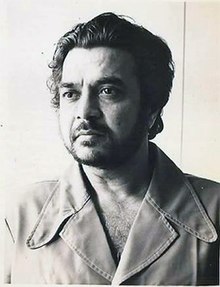| Satyadev Dubey | |
|---|---|
 | |
| Born | (1936-07-13)13 July 1936 Bilaspur, Central Provinces and Berar, British India (present-day Chhattisgarh, India) |
| Died | 25 December 2011(2011-12-25) (aged 75) Mumbai, Maharashtra, India |
| Nationality | Indian |
| Other names | Pt. Satyadev Dubey |
| Occupations | |
| Awards | Sangeet Natak Akademi Award (1971) National Film Award for Best Screenplay: Bhumika (1978) |
Satyadev Dubey (13 July 1936 – 25 December 2011) was an Indian theatre director, actor, playwright, screenwriter & film director. He was awarded the Sangeet Natak Akademi Award in 1971.
He won the 1978 National Film Award for Best Screenplay for Shyam Benegal's Bhumika and 1980 Filmfare Best Dialogue Award for Junoon. In 2011, he was honoured with the Padma Bhushan by the Government of India.
Biography
Satyadev Dubey was born in Bilaspur now in Chhattisgarh in 1936. He moved to Mumbai with the aim of becoming a cricketer, but ended up joining the Theatre Unit, a theatre group run by Ebrahim Alkazi, which also ran a school for many budding artists. Later when Alkazi left for Delhi to head the National School of Drama, Dubey took over Theatre Unit, and went on to produce many important plays in the Indian theatre.
He produced Girish Karnad's first play Yayati, and also his noted play Hayavadana, Badal Sarkar's Ewam Indrajit and Pagla Ghoda, Chandrashekhara Kambara's Aur Tota Bola (Jokumaraswamy in original Kannada), Mohan Rakesh's Aadhe Adhure, Vijay Tendulkar's Khamosh! Adalat Jaari Hai, and A Raincoat For All Occasions and Jean Anouilh's Antigone in 2007.
He is credited with the discovery of Dharmavir Bharati's Andha Yug, a play that was written for radio; Dubey saw its potential, sent it across to Ebrahim Alkazi at National School of Drama. When staged in 1962, Andha Yug brought in a new paradigm in Indian theatre of the times.
He made two short films Aparichay ke Vindhachal (1965) and Tongue In Cheek (1968), and directed a Marathi feature film, Shantata! Court Chalu Aahe (1971), based on Vijay Tendulkar's play, which in turn is based on Friedrich Dürrenmatt's story "Die Panne". Dubey had a five decade long and prolific career as theatre actor, director and playwright.
Filmography
Writer
- Shantata! Court Chalu Aahe (1971, director)
- Ankur (1974, dialogue, screenplay)
- Manzilein Aur Bhi Hain (1974, dialogue)
- Nishant (1975, dialogue)
- Bhumika (1977, dialogue, screenplay)
- Junoon (1978, dialogue)
- Kalyug (1980, dialogue)
- Aakrosh (1980, dialogue)
- Vijeta (1982, dialogue, screenplay)
- Mandi (1983, screenplay)
Actor
- Deewaar (1975) - Actor (uncredited)
- Nishant (1975) - Priest (Pujari)
- Kondura (1978) - Ramanayye Master
- Anugraham (1978)
- Godam (1983) - Dharma
- Bharat Ek Khoj (1988, TV Series) - Chanakya
- Pita (1991)
- Maya (1993)
- Aahat Season 1 (1995-2001) (TvSeries)
- Hanan (2004) - Mahapoojary
- Ata Pata Lapatta (2012) - Pagla Baba (final film role)
References
- "Entertainment News, Celebrity News, Latest Movie News, Breaking News | Entertainment - Times of India".
- Dubey, Bharti (25 December 2011). "Satyadev Dubey, noted theatre personality, passes away". The Times of India. Mumbai. Archived from the original on 17 July 2012. Retrieved 6 December 2012.
- "Theatre guru Satyadev Dubey passes away". The Hindu. Mumbai. 25 December 2011. Retrieved 6 December 2012.
- Karnad, Girish (25 November 2007). "Drama with a distinct vision". The Hindu. Archived from the original on 6 December 2007. Retrieved 6 December 2012.
- Dutt, Devina (16 November 2008). "Reaction matters to me". The Hindu. Archived from the original on 16 April 2010. Retrieved 6 December 2012.
- "One stage to another". The Telegraph. Calcutta. 7 November 2005. Archived from the original on 11 September 2012. Retrieved 6 December 2012.
- "A Court Rises to His Honour | Outlook India Magazine". 5 February 2022.
- "Theatre Ke Anokhe Dubey - Indian Express".
External links
- Satyadev Dubey at IMDb
- "The Fury And The Ecstacy". Tehelka. Vol. 5, no. 45. 15 November 2008.
| Filmfare Award for Best Dialogue | |
|---|---|
| 1959–1970 |
|
| 1971–1990 |
|
| 1991–2010 |
|
| 2011–present |
|
- Indian male screenwriters
- Indian theatre directors
- Indian male stage actors
- Indian male film actors
- Marathi film directors
- Indian male television actors
- Recipients of the Sangeet Natak Akademi Award
- Indian male dramatists and playwrights
- 1936 births
- 2011 deaths
- Recipients of the Padma Bhushan in arts
- Hindi theatre
- 20th-century Indian dramatists and playwrights
- Writers from Madhya Pradesh
- 20th-century Indian male actors
- Marathi screenwriters
- Screenwriters from Madhya Pradesh
- 20th-century Indian male writers
- Best Original Screenplay National Film Award winners